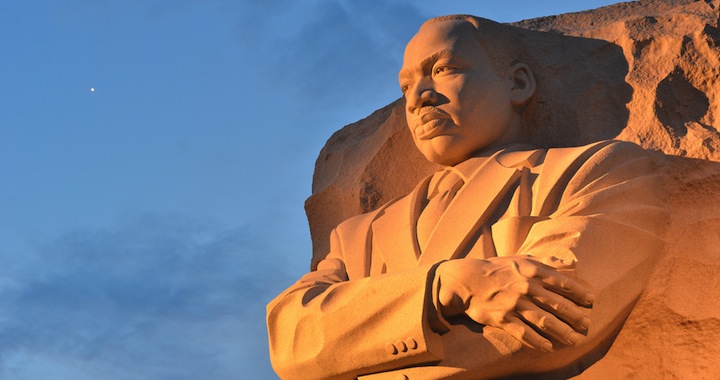“When I take the oath of office next year, I will restore law and order to our country. Believe me. Believe me, ” said Donald Trump last night as he accepted the Republican presidential nomination in Cleveland.
In a world full of fear of mass shootings and terrorist attacks, Trump argued that a politics of “law and order” is what America needs for public safety and a prosperous economy. Seeking to assuage the anxiety of rich white men and social conservatives, Trump’s speech echoed Richard Nixon’s invocation of “law and order” in his Address accepting the Republican presidential nomination in 1968.
Five years earlier in 1963, Dr. Martin Luther King, Jr. wrote his “Letter from the Birmingham Jail, ” answering eight white pastors’ “anxiety over our willingness to break laws.” In his now famous epistle, King made a clear-cut a distinction between just and unjust laws. “An unjust law is a code that is out of harmony with the moral law, ” King wrote. “To put it in the terms of Saint Thomas Aquinas, an unjust law is a human law that is not rooted in eternal and natural law. Any law that uplifts human personality is just. Any law that degrades human personality is unjust. All segregation statutes are unjust because segregation distorts the soul and damages the personality. It gives the segregator a false sense of superiority, and the segregated a false sense of inferiority.”
With his back up against the wall of a Birmingham prison cell, King translates the theology of Thomas Aquinas to appeal to Catholics, evangelicals, multi-faith leaders and secular activists. As Trump prepares to deport 11 million immigrants and ban all Muslims from entering the United States, we must ask how this uplifts human personality?
King goes on to write “I must confess that over the last few years I have been gravely disappointed with the white moderate. I have almost reached the regrettable conclusion that the Negro’s great stumbling block in the stride toward freedom is not the White Citizen’s Counciler or the Ku Klux Klanner, but the white moderate who is more devoted to ‘order’ than to justice; who prefers a negative peace which is the absence of tension to a positive peace which is the presence of justice.”
Through non-violent direct action protest, Dr. King sought to “arouse the conscience of the community over its injustice” to African Americans and invited white moderates to join the civil rights struggle. Dr. King believed that the conscience, the innate sense of right and wrong belonging to all humans, can compel the moral conversion of white moderate Christians. We need this faith now more than ever.
Just as in the sixties, the South will play a critical role in the Presidential election this year. As a graduate of New York Military Academy in 1964, Trump needs North Carolina to win the Presidency in 2016. He is doubling down on Nixon’s Southern Strategy through a message of militarized masculinity that appeals to disaffected white men; however, America and the South have changed. Our country is increasingly diverse in race and religion. Given the anxiety and instability in our current moment, Dr. King asks the critical question: Are we as Americans going to seek a politics of law and order or a politics of justice and love?

